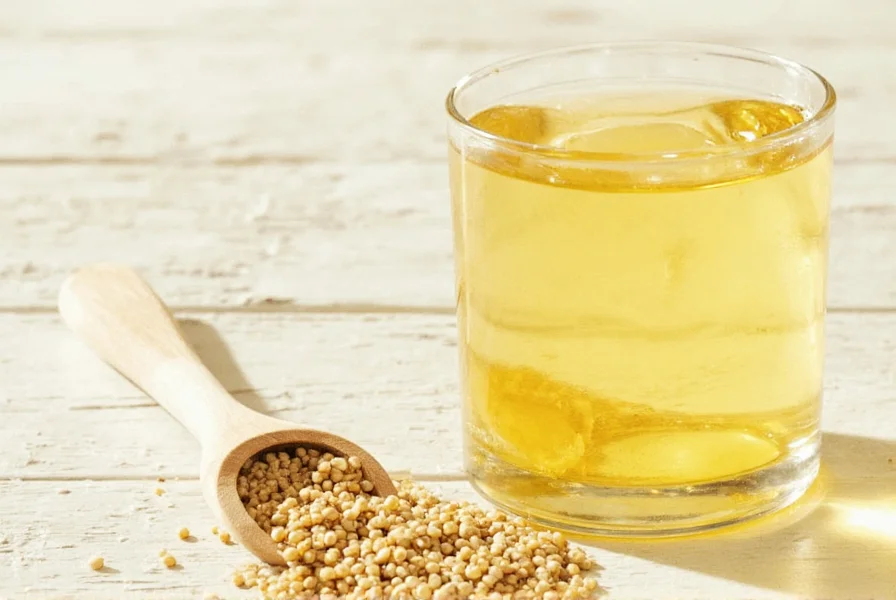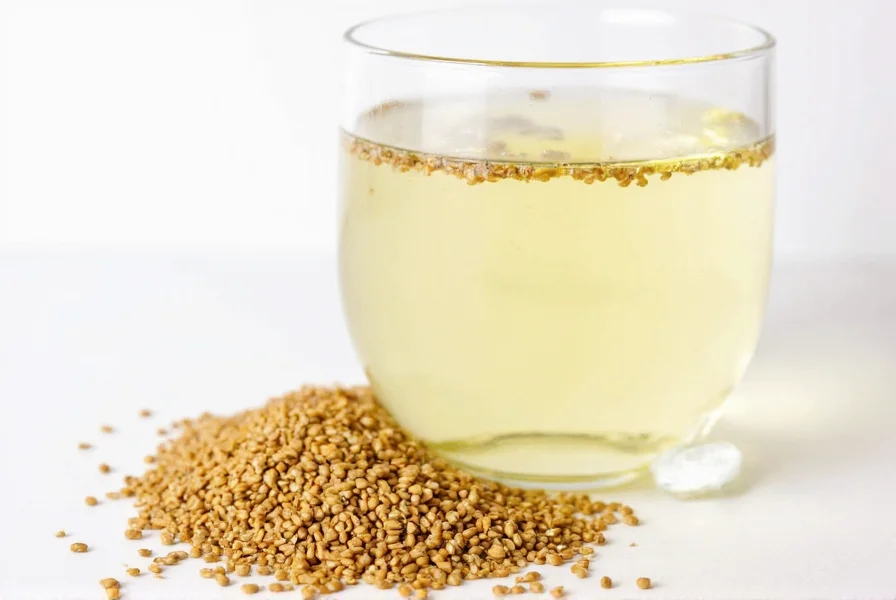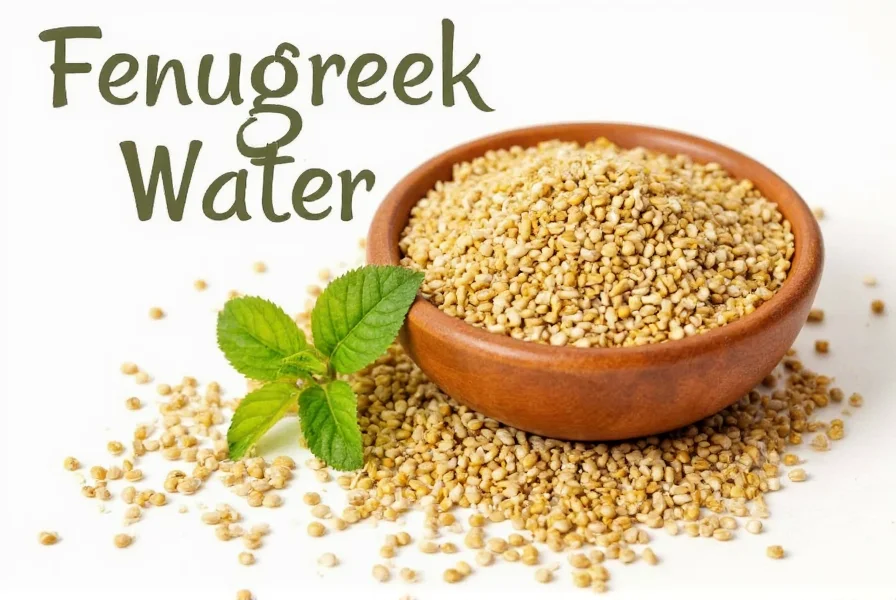Fenugreek water has been used for centuries in traditional medicine systems across Asia and the Middle East. This simple preparation harnesses the bioactive compounds in fenugreek seeds, particularly galactomannan fiber and diosgenin, which contribute to its potential health effects. Unlike supplements, fenugreek water provides a gentler delivery of these compounds, making it suitable for regular consumption when prepared correctly.
What Is Fenugreek Water and How Is It Prepared?
Fenugreek water refers to a liquid preparation made by soaking or boiling fenugreek seeds (Trigonella foenum-graecum) in water. The two primary preparation methods yield different concentrations and benefits:
| Preparation Method | Process | Best For |
|---|---|---|
| Overnight Soak | 1-2 tsp seeds in 1 cup water overnight | Daily wellness, mild digestive support |
| Boiled Decoction | 1 tsp seeds boiled in 2 cups water for 5-10 minutes | Targeted benefits like lactation support |
The overnight soak method creates a milder preparation ideal for regular consumption, while the boiled version concentrates active compounds for specific therapeutic purposes. Many people wonder how to make fenugreek water for lactation specifically—lactating mothers typically use the boiled method with 1 teaspoon of seeds per serving, consumed 2-3 times daily.
Scientifically Supported Benefits of Fenugreek Water
Research provides varying levels of evidence for different applications of fenugreek water:
Lactation Support
Multiple studies confirm fenugreek's galactagogue properties. A 2018 review in Complementary Therapies in Clinical Practice found that fenugreek significantly increased milk production in breastfeeding mothers within 24-72 hours. The mechanism appears related to diosgenin stimulating milk-producing hormones. For those searching for fenugreek water benefits for breastfeeding, this represents the most evidence-backed application.
Blood Sugar Management
Research suggests fenugreek water may help regulate blood glucose levels. A 2020 study in Nutrition Reviews analyzed multiple trials showing fenugreek's fiber content slows carbohydrate absorption. Participants drinking fenugreek water before meals demonstrated improved postprandial glucose levels. Those investigating fenugreek water benefits for diabetes should note it complements—but doesn't replace—standard diabetes care.
Digestive Health
The mucilaginous fiber in soaked fenugreek seeds acts as a natural demulcent, soothing irritated digestive tissues. Traditional Ayurvedic medicine has long used fenugreek water for heartburn and indigestion. Modern research supports its mild laxative effect and ability to reduce inflammation in the digestive tract.
Proper Usage Guidelines
Understanding correct dosage and timing maximizes benefits while minimizing risks:
- Standard serving: 1 cup prepared fenugreek water daily
- For lactation support: 2-3 cups daily, consumed between feedings
- Best consumption time: Morning on empty stomach or 30 minutes before meals
- Preparation tip: Strain seeds after soaking/boiling; discard seeds after 24 hours
Many people search for the perfect fenugreek seed water recipe—the simplest effective method involves soaking 1 teaspoon of seeds in 8 ounces of water overnight, then straining and drinking the liquid in the morning. Adding lemon enhances absorption of certain compounds.
Safety Considerations and Potential Side Effects
Fenugreek water is generally safe when consumed in moderation, but awareness of potential issues is crucial:
Common Side Effects
Some users experience mild effects including:
- Maple syrup-like body odor (harmless but noticeable)
- Mild digestive upset when first starting
- Increased bowel movements
Those researching fenugreek water side effects should know that serious reactions are rare but possible. A 2021 case report in Clinical Toxicology documented hypoglycemia in a diabetic patient who consumed excessive amounts without medical supervision.
Contraindications
Fenugreek water isn't appropriate for everyone. Avoid or consult your doctor if you:
- Are pregnant (may stimulate uterine contractions)
- Have peanut or chickpea allergies (cross-reactivity possible)
- Take blood-thinning medications
- Have hormone-sensitive conditions
Many women specifically search about fenugreek water during pregnancy—current evidence suggests avoiding it during pregnancy due to potential uterine stimulation effects, though it's generally considered safe postpartum for lactation support.

Fenugreek Water vs. Other Forms
Understanding the differences between preparation methods helps optimize usage:
- Fenugreek water: Gentler effect, suitable for daily use, lower risk of side effects
- Capsules/powder: Higher concentration, more consistent dosing, better for therapeutic purposes
- Fresh sprouts: Different nutrient profile, milder effect
People often compare fenugreek water vs capsules—water provides a more gradual release of compounds with fewer gastrointestinal side effects, while capsules deliver standardized doses for specific therapeutic goals. For general wellness, water preparation offers an excellent balance of efficacy and safety.
Research Gaps and Realistic Expectations
While traditional use of fenugreek water spans centuries, modern research has limitations:
- Most studies use concentrated extracts rather than water preparations
- Long-term safety data for daily consumption is limited
- Individual responses vary significantly based on metabolism
Be wary of exaggerated claims about fenugreek water for weight loss or fenugreek water for hair growth. While some traditional practices suggest these benefits, robust scientific evidence is currently lacking. Fenugreek water may support overall wellness that indirectly affects these areas, but it's not a magic solution.

Integrating Fenugreek Water Into Your Wellness Routine
For those considering adding fenugreek water to their regimen:
- Start with small amounts (¼ cup daily) to assess tolerance
- Monitor effects for 2-3 weeks before increasing dosage
- Combine with balanced diet and healthy lifestyle practices
- Consult healthcare providers if managing medical conditions
- Track changes in symptoms or wellness markers
Remember that fenugreek water benefits for diabetes management or other health conditions work best as part of a comprehensive approach, not as standalone treatments. Consistency matters—most benefits manifest after 1-2 weeks of regular consumption.
Conclusion
Fenugreek water represents a time-tested wellness practice with growing scientific support for specific applications, particularly lactation support and blood sugar management. When prepared correctly and consumed appropriately, it offers a gentle way to incorporate fenugreek's benefits into daily life. As with any natural remedy, realistic expectations, proper dosage, and awareness of individual health circumstances are essential for safe and effective use. Always consult healthcare professionals before using fenugreek water for therapeutic purposes, especially if managing chronic health conditions or taking medications.
Frequently Asked Questions
How long does it take for fenugreek water to increase milk supply?
Most breastfeeding mothers notice increased milk production within 24-72 hours of regular consumption. Research shows peak effects typically occur within 1-2 weeks of consistent use (2-3 cups daily). Individual responses vary based on hydration, nursing frequency, and overall health.
Can I drink fenugreek water every day?
Yes, moderate daily consumption (1-2 cups) is generally safe for most adults. Long-term studies are limited, so taking periodic breaks (such as 5 days on, 2 days off) may be prudent. Those with medical conditions should consult healthcare providers before daily use.
Does fenugreek water help with PCOS symptoms?
Preliminary research suggests fenugreek may improve insulin sensitivity in women with PCOS, which could help manage symptoms. A 2019 study in Phytotherapy Research showed improved menstrual regularity and reduced insulin resistance. However, more research specifically on fenugreek water (vs. extracts) is needed before making definitive claims.
What's the best time to drink fenugreek water for weight loss?
While fenugreek water isn't a weight loss solution, drinking it 30 minutes before meals may promote satiety due to its high fiber content. The morning (on empty stomach) is generally considered the most effective time for overall metabolic benefits. Remember that sustainable weight management requires comprehensive lifestyle changes.
How should I store prepared fenugreek water?
Refrigerate prepared fenugreek water and consume within 24 hours. The soaked seeds should be discarded after this period as they can develop bacteria. Use glass containers rather than plastic for storage, and always strain the liquid before refrigerating to prevent over-extraction of compounds that might increase bitterness or side effects.











 浙公网安备
33010002000092号
浙公网安备
33010002000092号 浙B2-20120091-4
浙B2-20120091-4